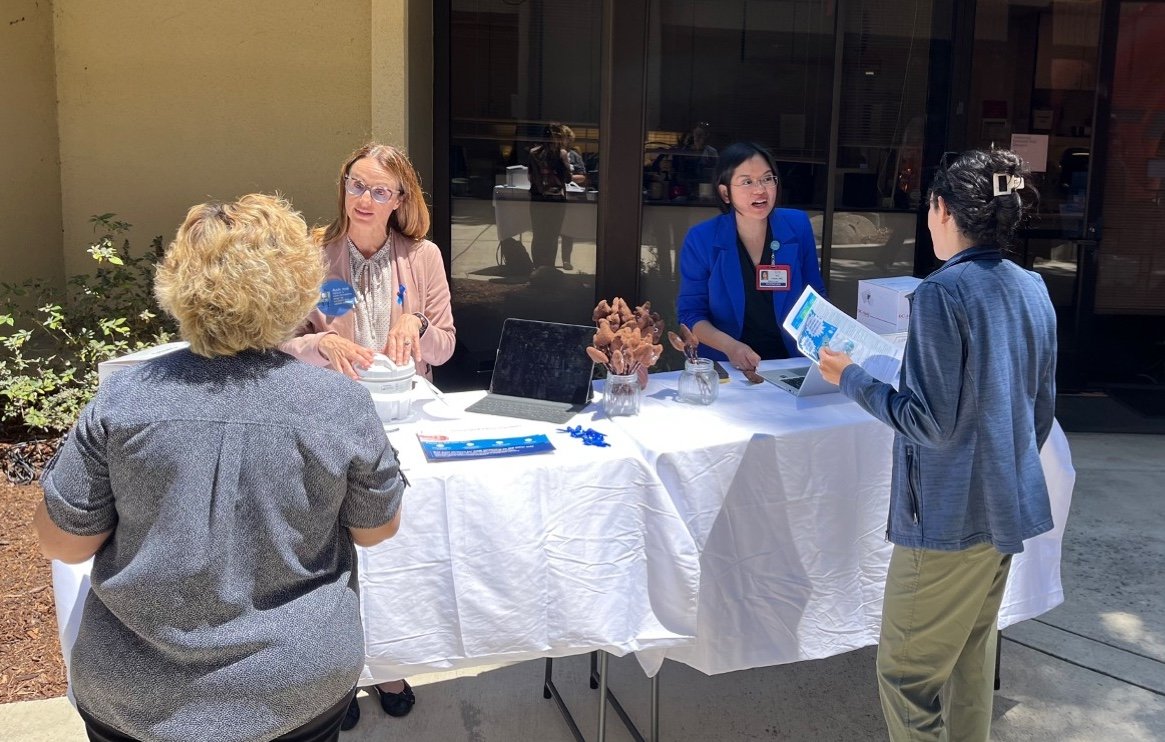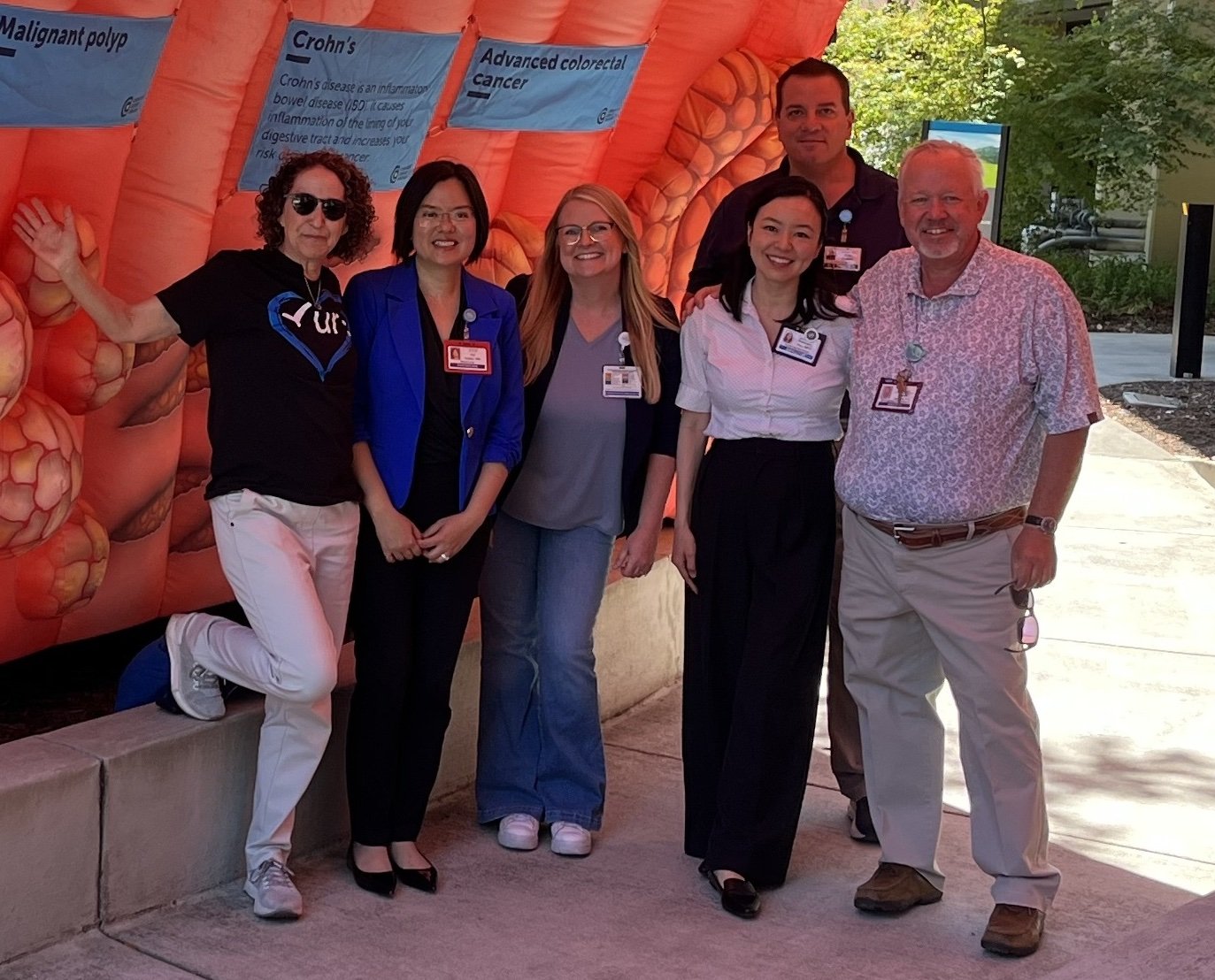Strollin’ Through the Colon at Kaiser Permanente
On a bright Tuesday afternoon in June, Kaiser Permanente held a free outdoor event for members and staff at its Park Shadelands Medical Offices location, Strollin’ Through the Colon. The first of its kind in Shadelands, the event focused on colorectal cancer screening and prevention in a big, experiential way.
A giant inflatable segment of the human colon—a tunnel, as it were, large enough to walk through—took visitors on a short trip from normal to pre-cancerous and cancerous conditions of the colon in only a few steps.
“A walk through the inflatable colon shows you what a healthy colon looks like, and then what benign polyps, precancerous polyps, and cancerous lesions look like—all to bring awareness to colorectal cancer prevention,” said Pei Casas, MD, Physician Site Leader at Kaiser Permanente Park Shadelands Medical Offices. “When people are aware of what colorectal cancer actually looks like, and how important screenings are for catching abnormalities before they become cancerous, they are more likely to stay on top of healthy behaviors and regular screenings. We want to help people understand this cancer and take control of their health.”
Statistically, in the United States, 1 in 25 will be diagnosed with colorectal cancer in their lifetime, even with no family history. Colorectal cancer is the second leading cause of cancer-related deaths when statistics for men and women are combined, and estimates suggest approximately 154,270 people in the U.S. will be diagnosed with colorectal cancer in 2025. Traditionally, the medical community recommended starting colorectal screenings at age 50. That has changed, and medical professionals are now recommending the first colorectal cancer screening at age 45 for average risk individuals.
James Lambert, RN, Emergency Department Director at Kaiser Permanente Antioch Medical Center and a champion for colorectal cancer awareness, was on hand to answer questions and provide expert information and insight into this largely preventable disease. He was joined by other medical professionals and representatives who were there to share information and answer questions about screenings.
There are currently three reputable, dependable screenings for colorectal cancer—a fecal immunochemical test (FIT), Cologuard, and colonoscopy.
“FIT, which tests for blood in the stool, is a kit that can be picked up by members at Kaiser Permanente or mailed to members for collection at home,” said Michael Maddox, Operations Director, Kaiser Permanente Park Shadelands Medical Offices. “The kit can be mailed back to Kaiser, or dropped off on campus in a special drop-off box, and then we’ll send it to the lab for analysis.”
Cologuard is a next-level screening that tests for both blood and abnormal DNA in stool, also collected at home. The test is ordered by a physician and sent directly to the patient’s home; the collection is returned by mail to the Cologuard lab. A representative from Cologuard was at the information table to discuss the test and provide information to visitors.
Both the FIT kit and Cologuard are relatively easy at-home collection screenings, and results are discussed with the patient as they come in. Next steps are based on results and personal and family medical history.
The colonoscopy, the traditional way to screen for polyps and colon cancer, while more invasive and with risk of complications, is also the most sensitive screening tool.
As a benefit to members who asked, Dr. Casas was available to access their patient files to determine what screenings they were due for. Where needed, she scheduled screenings right there, on the spot, for colorectal cancer, breast cancer, cervical cancer, and diabetes.
“Colon cancer is easily detectable if caught early during cancer prevention screenings,” said Rosemary Phu, Director of Gastroenterology at Kaiser Permanente Walnut Creek. “Many times, people have no symptoms of colorectal cancer, and issues can only be detected through screenings. That’s why it’s important to be screened early and regularly for this and other cancers—screenings can save lives. There’s no doubt. And that’s why an event like this is critical to healthcare—this raises awareness in our members and our staff about all cancers and the importance of preventive care.”
Kaiser Permanente Strollin’ Through the Colon Team: (l-r) Julie Sher, Associate Chief Administrative Officer; Dr. Pei Casas, Physician Site Leader; Caroline Foreman, Administrative Specialist; Rosemary Phu, Director of Gastroenterology Kaiser Permanente Walnut Creek; RN James Lambert, Emergency Department Director, Kaiser Permanente Antioch Medical Center; (back) Michael Maddox, Operations Director, Park Shadelands Medical Offices.
The message of the day: Whether a Kaiser Permanente member or not, all individuals aged 45 and over with average risk should be screened for colorectal cancer. Primary care providers are a good starting point to discuss screening options and next steps. Individuals with a family history of colorectal cancer should talk with their physicians about their risk and individualized screening plans.








